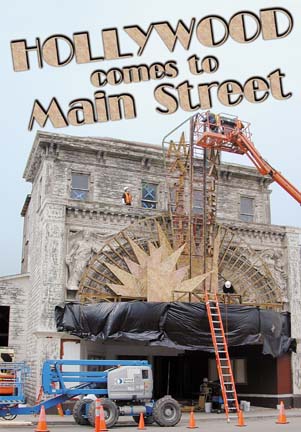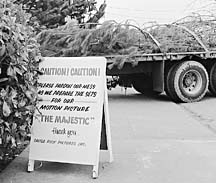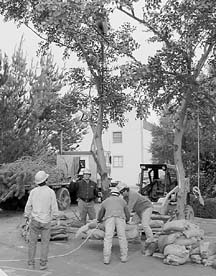|  

Story & photos by BOB DORAN
AFTERNOONS IN THE TOURIST OFF-SEASON ARE a quiet time in Ferndale. But not this year. Main Street is bustling with activity. Another movie company has come to "the Victorian Village." As men in hard hats put the finishing touches on three buildings fabricated for a film called The Majestic, Karen Pingitore, (In photo below) president of the Ferndale Chamber of Commerce, is working with a video crew shooting a TV commercial. Behind her, at the corner of Ocean and Main, is the town hall, an imposing building with a clock tower.
![[photo of Karen Pingitore]](cover0315-karen.jpg) Left: Karen Pingitore and husband Carl, owners of the Ferndale Clothing Co., have lived in Ferndale 11 years. Karen formerly worked in Hollywood as head of post-production for Warner Bros. and Carl worked in the industry for 42 years as a television and film producer and editor. His credits include Dirty Harry and Play Misty for Me. Left: Karen Pingitore and husband Carl, owners of the Ferndale Clothing Co., have lived in Ferndale 11 years. Karen formerly worked in Hollywood as head of post-production for Warner Bros. and Carl worked in the industry for 42 years as a television and film producer and editor. His credits include Dirty Harry and Play Misty for Me.
Wait a minute. Ferndale doesn't have a town hall. Looking closely you see that this is one of the sets under construction. The clock that goes in the tower has just arrived on a fork lift. Hollywood masons on one side of the building are troweling faux cement, crafting an imaginary basement. On the other side a painter dabs red paint creating a brick effect that completes the illusion. The three-story building completely envelops U.S. Bank. The bank's parking lot is undergoing its own transformation. A crew unloads several kinds of trees creating a city park on top of the asphalt. Out front a sandwich-board sign informs the public that the bank is still open for business.
Below left: Shayne McLaughlin from Los Angeles unloads town hall's clock and at right,
James Evenson from Fortuna paints bricks.![[photo of James Evenson painting]](cover0315-paint.jpg) ![[photo of Shayne McLaughlin with clock]](cover0315-clock.jpg)
The sign was created by Castle Rock, the film production company that's transforming Ferndale into a small coastal town called Lawson. Besides supplying similar signs for every business along Main, the folks from Hollywood are funding an advertising campaign and the TV commercial is part of it. A print ad in the Ferndale Enterprise reads, "Hollywood hasn't gone to our heads! It's still business as usual in Ferndale's unique shops and restaurants."
This isn't the first time Ferndale has experienced the thrill of having Hollywood take over the town. Along with a number of smaller productions, director Tobe Hooper's adaptation of a Stephen King story, Salem's Lot, was filmed in the town in 1978. And in 1994 Warner Brothers used the village as the backdrop for Outbreak, a film about a deadly epidemic infecting a small town. Before the story reached its semi-happy ending, the military had cordoned off the town and was ready to destroy it. The Outbreak experience is still fresh in the minds of a group of Ferndale's civic leaders invited by the Journal to attend a showing of State and Main, a movie that was shot in another small town. Writer/director David Mamet's film opened two weeks ago at the Broadway in Eureka. According to the plot, a Hollywood film crew comes to a quaint New England town called Waterford. The crew is intent on using Main Street, Waterford, as the set for The Old Mill, a period piece about the quest for purity. By the end of State and Main, Waterford has sold its soul, exchanging some of its purity for a pile of cash. How does Ferndale's experience with Hollywood relate to what unfolds in State and Main? "Money is everything," said Caroline Titus, publisher and editor of the Ferndale Enterprise. "You don't sell your soul, but you sell a block of time to the movies when a production is in town," said Joe Koches, who owns The Blacksmith Shop on Main Street. (In photo below left) "Hollywood buys a certain amount of your time and a certain amount of your city. That's the movie biz. ![[photo of Joe Koches]](cover0315-blacksmith.jpg) "I think it's a wonderful thing to have happen and it's exciting as hell. Think of all the hopes everybody has that they're going to get a part, all of the construction that's going on, all of the commerce happening in our town, across the river and up here in Eureka, all of the smiles. All simply because of this movie." "I think it's a wonderful thing to have happen and it's exciting as hell. Think of all the hopes everybody has that they're going to get a part, all of the construction that's going on, all of the commerce happening in our town, across the river and up here in Eureka, all of the smiles. All simply because of this movie."
Koches knows the production of The Majestic will effect his business. He and the rest of the community have had the opportunity to express their concerns at meetings with Castle Rock. "Is it going to affect my business? Yes. It already has. My January was the biggest January I've had in 21 years. February's the same way. The effect on a retail store is very positive. "There will be a certain block of time where it will be a little bit hard for people to get into my store. That's what we sell -- and that's the only soul we're selling. Hollywood buys your town for that block of time and they get to do whatever the hell they want to do because that's what they've paid for. Isn't that the way it works?" Not exactly, said Karen Pingitore who owns Ferndale Clothing Co. on Main. "I wouldn't say they get to do whatever they want to." State and Main includes a subplot about the negotiations for use of Main Street. The town's star-struck Mayor George Bailey is happy to oblige the film company. (Does his name ring any bells?) The local lawyer has other feelings. At first he suggests asking $40,000 for the use of Main Street. Before the story ends he's demanding 3 percent of the adjusted gross. "The whole town has been warped by the presence of the movie company," says the lawyer's fiancée, just before she dumps him for a screenwriter who has come to town with the crew. Pingitore saw a parallel in the dark humor. "There are elements in Ferndale, individuals negotiating on their own. There were things I related to on a funny side. The bottom line is there's a great infusion of cash that we wouldn't otherwise have in the county where all of us are trading the same dollars. "It takes something like a film company of this magnitude coming in to generate that kind of money, whether it's at a retail store or resident occupancy tax, or restaurant food, buying supplies or whatever. [Castle Rock] is consciously going out of their way to deal on a local level instead of importing everything from Southern California. And when they're done they will leave behind a lot of money." How much money? Humboldt County Film Commissioner Jensen Rufe estimates around $6 million. "Outbreak shot for 14 days in Ferndale and this is about twice that. We estimate Outbreak spent about $3 million, so I infer this will bring in twice that," he said. "It effects a wide range of people in a wide range of ways. There's a major influx of cash coming into town. The businesses affected include building supply companies, restaurants and, of course, lodging, plus locals get to work on the film. My roommate's working on the film." ![[photo of Curley Tate]](cover0315-curley.jpg) "They're living here in town," adds Curly Tate who runs Curley's Grill at the corner of Main and Ocean. "They eat at the restaurants, they're there -- and they're interesting people. It's not only the money aspect, it's the people that you meet. You hang out with them and see how their life is different than yours." "They're living here in town," adds Curly Tate who runs Curley's Grill at the corner of Main and Ocean. "They eat at the restaurants, they're there -- and they're interesting people. It's not only the money aspect, it's the people that you meet. You hang out with them and see how their life is different than yours."
Ferndale got an opportunity to get to know the construction crew on a recent Saturday night. Castle Rock rented Belotti Hall at the Ferndale Fairgrounds and invited everyone to a potluck with an open bar they called a "north meets south get-together." Castle Rock's friendly attitude has contributed toward making the Majestic experience different from the coming of Outbreak. The first problem with the production was the timing. "Outbreak came in August, right in the middle of the (Humboldt County) Fair for godsakes, just when you don't need more people in town," said Koches. "Castle Rock is coming at a time of year when they're welcome. They came in and said, `We want to do it during January, February, March.' They'll start shooting in March and be out of your town on June 1 because they realize that the town changes after that. We turn into a tourist town." There were other problems with Outbreak caused by the fact that the film was rushed into production, in part because another epidemic movie was in the works, one based on the infectious bestseller, The Hot Zone. "Outbreak started shooting without a finished script," said Pingitore. "That's like building a house without a blueprint. You leave yourself wide open for all kinds of disasters when you do that. "They had their principle actors here with no dialogue. So, `What are we going to do? We're going to run amok with helicopters in the street to make up some time since we have this whole crew here.' It went down hill from there." All present agreed that Castle Rock is much better organized. "They have a finished script and they have talked with the people who made Outbreak asking about potential problems," said Pingitore. "And they understand the uniqueness of a small town like Ferndale," she added. "They understand that we're 1,400 personalities and that you just don't come in and roll over everybody like they did with Outbreak. "Part of Outbreak's problem was, because of the unfinished script, dollars started getting away from them too fast. They had no money to negotiate with individual businesses. Instead they were flying on a wing and a prayer keeping their fingers crossed that everyone didn't jump up screaming lawsuits. "There were no deals made. They'd come around and say, `Here's $100 because we're going to be getting on your roof tonight.' That was it. They knew better, but they didn't have a choice at that point. They had no money. They were lucky push didn't come to shove." Castle Rock has more money, $67 million according to Variety. They are negotiating on an individual basis, business by business, according to Pingitore. "It's a wide spectrum of issues from renting the fairgrounds for six months to make what's basically a back lot, to renting the city's parking lot, to big business areas like the corner where they had a set constructed on to what I call `the impact block' -- the block where most of the action will take place. "The businesses there have different issues from someone down the street three blocks who only has window dressing to be concerned about or `Don't go out on your balcony when we're shooting, please.' It runs the gamut from $50 to $50,000 and anywhere in between." In December Castle Rock sealed an agreement with the city of Ferndale regarding use of city property including the use of Main Street and a parking lot that is now the site of the Majestic Theater. Location manager Rory Enke, who has been handling the negotiations, explained that during shooting every effort would be made to allow businesses on Main Street to remain open. He said people would be able to come and go except during a "take," the time when the cameras are actually rolling. When Jim Carrey's security force shows up they had different plans. "They are concerned because he has a vast following who might mob Ferndale," said Pingitore. "Apparently they've been in locations before where this has happened and it's disruptive to his mental state. He's trying to stay in character and they're yelling, `Jim, Jim, Jim' and who knows what else." "After Jim Carrey's security crew came to town the location manager (Enke) spoke to the City Council," said Titus. "He said, `We've got a problem. They're not comfortable with what we have planned for the set and such. They said they wanted it closed off further up the road, and that it was going to be a closed set.' "At our next chamber meeting our reverend, David Kilmer, suggested, `Why don't we all just wear Jim Carrey masks?' That would throw off the supposed throngs of fans coming to disrupt the filming.' "The creative minds of the Chamber of Commerce got a mask going and we printed it in the Enterprise. We also have colorized versions of the mask that the chamber is offering in exchange for a $5 donation to the Ferndale Community Chest."
![[photo of Caroline Titus]](cover0315-caroline.jpg)
 Caroline Titus (left), editor and publisher of the Ferndale Enterprise, has lived in Humboldt for 10 years. "My father was a location manager, so this is all one big circle coming back home." At light is a Jim Carrey mask. Caroline Titus (left), editor and publisher of the Ferndale Enterprise, has lived in Humboldt for 10 years. "My father was a location manager, so this is all one big circle coming back home." At light is a Jim Carrey mask.
In Ferndale "Community Chest" is not just a square on a Monopoly board, explained Pingitore. "It's an astounding one-man organization that this fellow, Ron Smith, has done for something like 37 years. He gets calls from people in town who tell him of neighbors going through hard times and he sees to it that they get food baskets or Christmas presents or have their electric bill paid."
Chamber members raised around $500 so far, money that they didn't intend for their own coffers. The mask idea was intended as a way of poking fun at Castle Rock for taking themselves too seriously and letting the film company know that the town as not about to let all commerce cease for a movie. For Enke, the closed-set furor is mostly semantic. "People are hung up on the word, `closed,'" he said. "They don't like it. The town will not be closed, but you have to create a protected zone so that people can't come up to the actors and say, `Can I have your autograph?'" "We're not shutting the town down," said Castle Rock publicist Ernie Malik. "In whatever little area we will be filming, the access will be limited. But I understand the locations department has made alternative routes available so we don't entirely disrupt the lives of the locals up there." Enke has hired a crew of what he calls `docents.' "Their only job will be to guide people to stores to help facilitate commerce," he said. "It's not going to be a closed set," said Pingitore. "My feeling is that if we had not gotten up-in-arms about it, they would have tried to put that over. When they got a bad reaction, they backed off." The company also given the chamber $5,000 for advertising to let the community know that the town is not shut down during filming.
![[photo of art director and construction foreman]](cover0315-supervise.jpg) Left: Art director Tom Walsh and Sean Gallagher, construction foreman, supervise the transformation of Ferndale into Lawson. Left: Art director Tom Walsh and Sean Gallagher, construction foreman, supervise the transformation of Ferndale into Lawson.
"After the meeting Friday I feel comfortable that the disruption the film company presents won't be any more than we had with Outbreak. Businesses will be open during normal hours. The difference is we'll be dressed for another time period." Shooting for The Majestic began in Los Angeles early in March. Action on the North Coast commences March 19 and continues for four to five weeks including at least one day on the beach in Trinidad. After a week in Mendocino shooting coastal establishing shots, the production moves back to Los Angeles. If all goes as planned the film should be done by the end of the year with a release during the holiday season, just in time to put it in contention for next year's Academy Awards. "And when the film comes out, it will say `filmed in Ferndale, California' in the credits," Tate points out. "That brings in tourists and it's good for business."
![[photo of workers ]](cover0315-awning.jpg) ![[photo of marquee]](cover0315-crane.jpg)
Above: Workers add an owning to Ferndale Meat Co. and at right, fine tune the Majestic marquee.  
Creating a forest on a parking lot.
Why Ferndale? ![[photo of Tom Walsh]](cover0315-artdir.jpg) THE MAJESTIC'S ART DIRECTOR, TOM WALSH, has done extensive work in television and film. Among his credits are John Carpenter's Vampires, Hush, The Apostle, Flipper, The Handmaid's Tale, Speed and the pilot for the TV series, "My So-Called Life." THE MAJESTIC'S ART DIRECTOR, TOM WALSH, has done extensive work in television and film. Among his credits are John Carpenter's Vampires, Hush, The Apostle, Flipper, The Handmaid's Tale, Speed and the pilot for the TV series, "My So-Called Life."
His job these past few months has been to turn Ferndale into Lawson, a sleepy seaside town circa 1951. He has been overseeing construction of the Majestic Theater, Mabel's Diner and Lawson's town hall along with changes in signage and window dressings for Main Street stores and the construction of interior sets at the fairgrounds. Actual filming is set to start Monday. Walsh took a few minutes out of his busy day last week to speak with the Journal. What does Ferndale offer for an art director? Ferndale has a natural environment. It's a real place. The buildings are real, the architecture has a lot of integrity. Movies are all about making things real, so it's always great when you can start with something that is real and then dramatically adjust it for the purposes of your story. Our script has some very specific needs: It requires a movie theater; it requires a diner and sort of a town hall, all in close proximity to one another at least photographically. It turned out Ferndale had the spaces that could accommodate those kind of sets. Sometimes you look for a place that has all that going for it, but you almost never can find everything in the place the camera would like it to be. That's where design, compromise and ideals all come together. You saw pictures of the town and thought it would work for your purposes? Well, I knew Ferndale. On vacations in the past I had been through Ferndale and was familiar with it. But (Castle Rock) hired a scout. The production designer, Greg Melton, and a scout traveled up and down the California coast last spring looking for an ideal environment. They shot a number of towns in California, but when we went through all of the location photos, Ferndale seemed to stand out as having more sense of a continuity of place. There was enough community pride within Ferndale to help them resist the modernizing that so many towns go through. There isn't a McDonald's; there isn't a Starbucks. It still has its own personal identity. The film is set in 1951, but the town doesn't really look like 1951. The town has a timeless quality about it which is great. It's a combination of 19th century, early 20th century and midcentury structures. It gives it more of a sense of reality as opposed to some movie sets where everything is locked in one time zone. Ferndale has a nice mix of things, which again, gives it more reality. The town in our story is supposed to be on the coast, and we are obviously close to the coast, but we're using the town in conjunction with other locations to create a sense of a forgotten town off the main drag. Besides the three buildings you constructed, what else are you doing to the town? You add signage and little details to tie the community together, but it is pretty much a set as it is. If we had to do that much more there would be no reason to come here. You would just build your own town. What's great about the Ferndale community is that a lot of it works already and you just make some subtle adjustments and some not so subtle adjustments to pull it together for the camera. How has it been working with the people of Ferndale? It has been great. It's a very supportive community and they've been very supportive of our efforts. I have only good things to say about this town. Will you be back? Oh, absolutely.
IN THE NEWS | CALENDAR Comments? E-mail the Journal: [email protected] 
© Copyright 2001, North Coast Journal, Inc. |